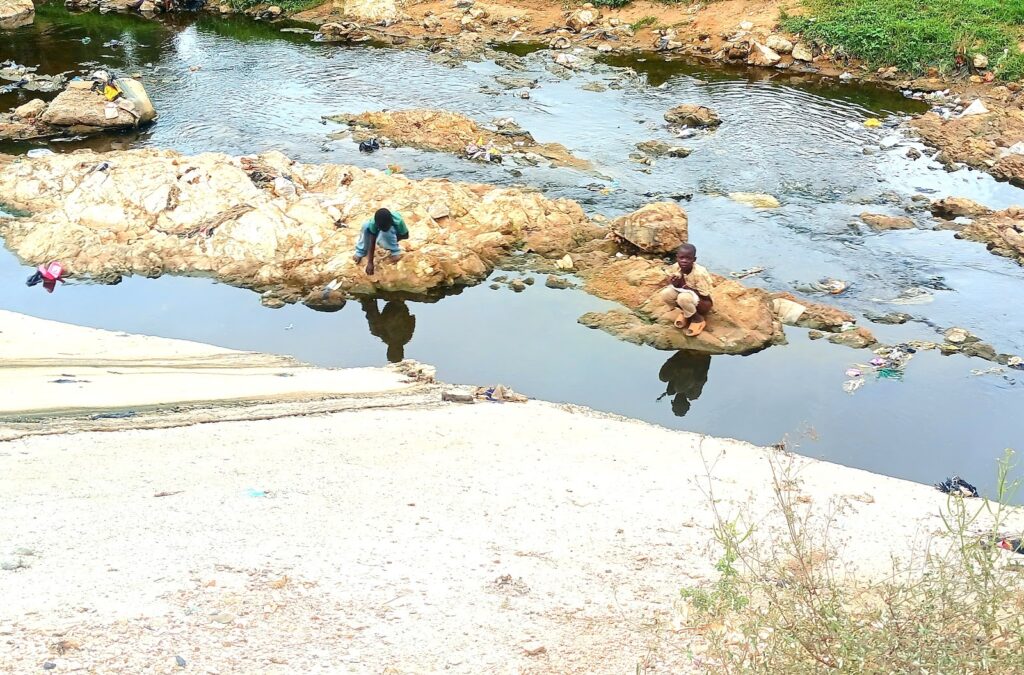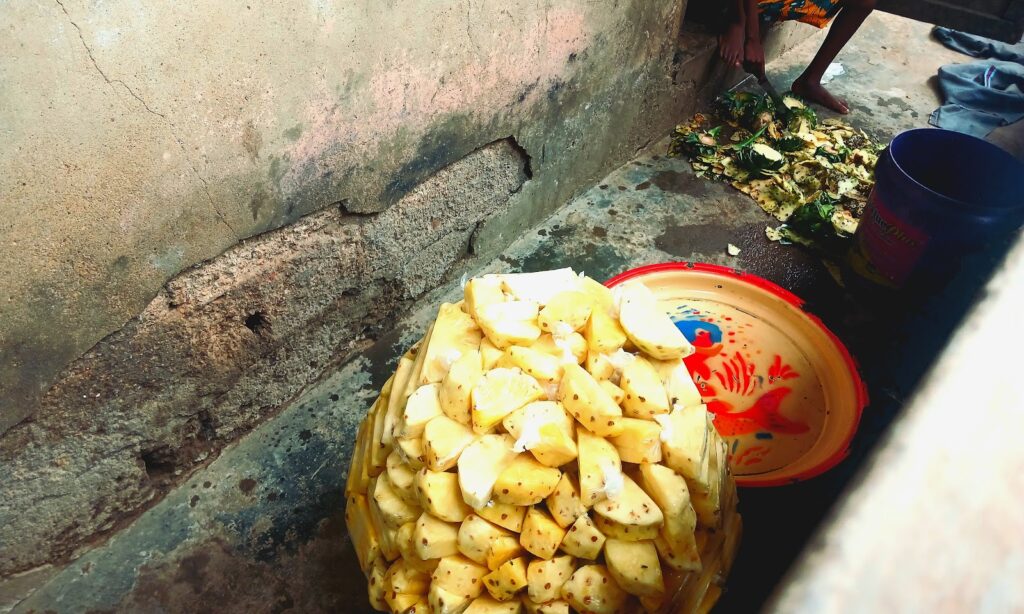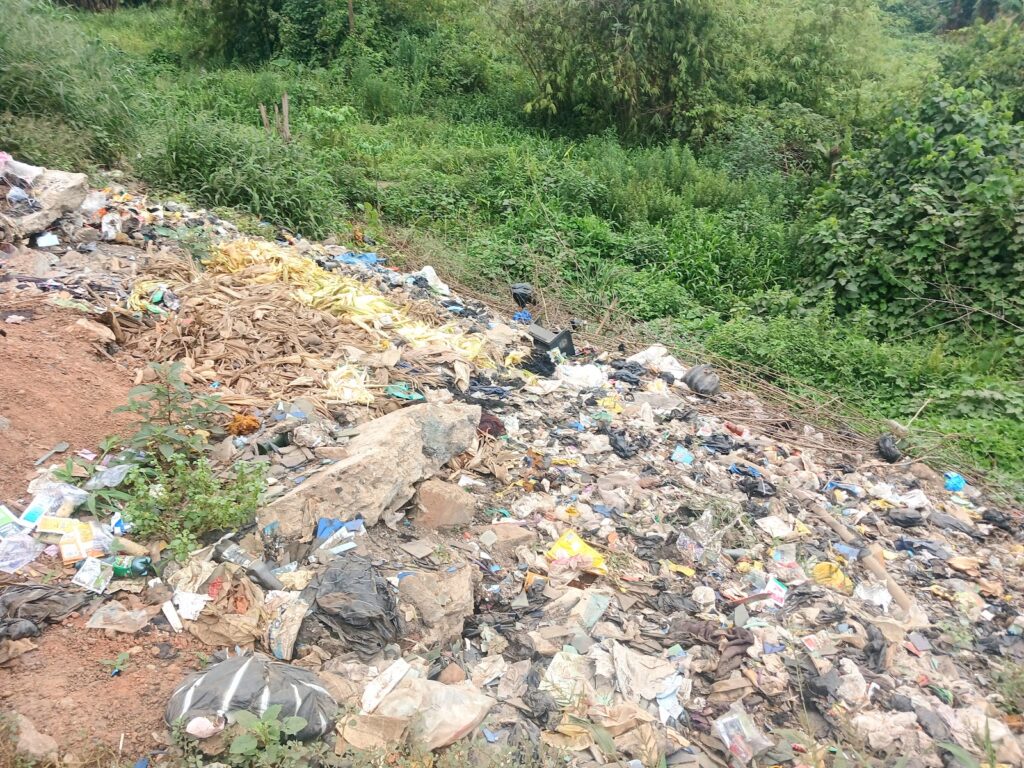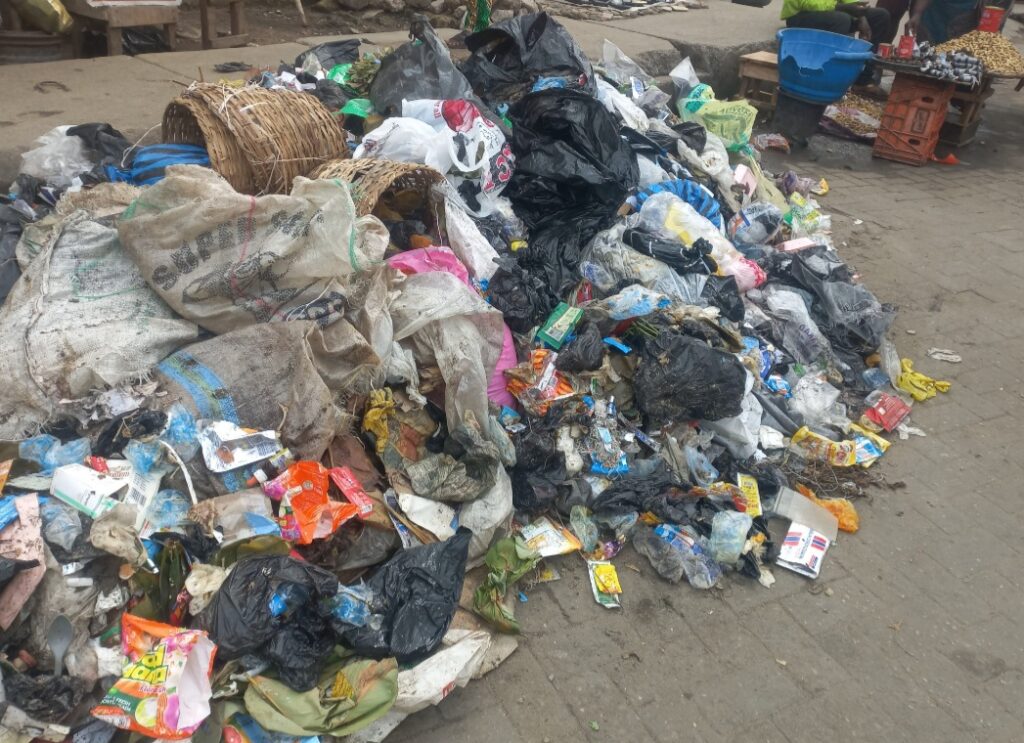It’s been three years since Adebayo Alamu, a vulcaniser, relocated to Ibadan, capital of Oyo State in South West Nigeria after he was evicted from his one-room apartment in the Ojodu-Berger area of Lagos due to his inability to pay rent.
He found a similar apartment for an affordable price in the Beere area of Ibadan, but it is one of many houses in the community without a toilet and bathroom. So, residents engage in open defecation.
The canal behind his room could even be considered the headquarters of open defecation in Beere. While men and children visit the canal to defecate openly, women usually come with potties to empty their faecal waste into the murky depths of the major drainage channel.
“Living here is very terrible, but I have no choice. I have to adapt to the discomfort,” Alamu told HumAngle during a visit to Beere on June 24. “The canal serves as the public toilet of many houses, and I hardly sleep sometimes because of the odour that spreads into my room. I would have left the house long ago, but there’s no financial strength. So, what can I do?”

The canal smelt of urine and faeces. There were fresh and dry excreted matters left open as houseflies feasted. Some children were also seen excreting openly.
“The truth is that most of the houses located here do not have toilets. So, there’s no choice but to settle for an alternative, which is open defecation. It’s not entirely the children’s fault,” Alamu said.
Unlike Alamu, who says he has no choice but to remain in the environment, Mary Abidoye, a fruit seller and single mother, has decided to vacate her one-room apartment by the end of July.
When HumAngle met her, she had just finished cutting some pineapples as flies from the canal perched on them. She sells the fruits in traffic and at motor parks. She admitted to putting the lives of her customers at risk, but she said she had no option.
“There’s no way we could stop people from defecating openly. I have to make money to feed myself and my son. So, all I do is make sure I manage to keep my surroundings clean because I sell edibles. I saw the condition of the house before I paid, but there was no choice. Now that I have made some savings, I am planning to move out of here.”

Cholera outbreak
There is a growing concern over the spread of cholera outbreak across Nigeria.
According to a health advisory from the Nigeria Centre for Disease Control and Prevention (NCDC), the disease mostly spreads through direct transmission by eating or drinking contaminated food or water and indirect transmission due to poor sanitation and lack of handwashing.
The symptoms are acute, painless, and watery diarrhoea, with or without vomiting.
As of Tuesday, July 2, when the centre gave its last update, Nigeria had recorded a total of 2,102 suspected cholera cases and 63 deaths across 33 states and 122 local government areas since the beginning of the year.
Lagos, Cross River, Bayelsa, Zamfara, Abia, Bauchi, Delta, Katsina, Imo, and Nasarawa are the most affected states.
The NCDC emphasised that improper refuse disposal and open defecation practices are endangering water safety and leading to cholera outbreaks.
Though the centre’s Director-General, Olajide Idris, urged Nigerians to adopt safe sanitation practices, HumAngle observes that many communities in the South West still lack functional toilets and other WASH (Water, Sanitation and Hygiene) facilities.

Unhygienic Lagos
Despite being the country’s economic hub, there is an alarming trend of rampant open defecation in Lagos, which is the epicentre of the ongoing cholera outbreak. Residents often excrete in the middle of highways because of inadequate toilet facilities for people whose shops are on the roadside and others. The indiscriminate disposal of waste is also common.
During a visit to the Ojodu-Berger axis, HumAngle observed gutters filled with fresh and congealed faeces capable of transmitting infectious diseases such as cholera.

Some houses in the state without septic tanks channel waste pipes from their toilets directly into gutters, making the stench of urine and faeces unbearable for passers-by.
The situation is worse in riverine areas such as Oworonshoki, Ilaje, and Bariga. For occupants of these houses, they defecate in the lagoon.
“I have been here for over 10 years and my house and others in my area do not have toilets. Since excreting is compulsory for every human, we have to join the trend we met, which is going to the lagoon to defecate. Though we are not comfortable with the situation, there’s no choice. Even my children always fall sick due to infections. We can only pray to the government to intervene,” said Titilope Ayobami, a resident of Bariga.
At the Okobaba Destitutes Home in the Ebute-Metta area of Lagos, our reporter was greeted with a heap of refuse, stinking toilets, and overflowing septic tanks. Amid the unpleasant smell oozing out of the compound, many residents were seen sharing their meals with flies that also frequented faeces in the nearby gutters.
Mohammed Baba, a lepper and secretary of the Integrated Dignity Economic Advancement (IDEA), a group that advocates for human rights and the welfare of people challenged by leprosy in Nigeria, said there are only 11 toilets being used by over 2,000 people with disabilities at the facility.
“We survive on salt water flowing through the community from the third mainland bridge due to the low-lying nature of Ebute-Metta. But we have become accustomed to the dirty environment as a normal part of our existence here.”

Efforts to curb outbreak
The United Nations Children’s Fund (UNICEF) has warned that children under the age of five are particularly vulnerable to severe dehydration and higher mortality rates during cholera outbreaks.
Celine Lafoucriere, UNICEF’s Chief Field Officer in Lagos, warned authorities to take deliberate steps to provide high-standard water and sanitation facilities and strengthen healthcare systems capable of responding to unique demands during outbreaks.
“Recurrent cholera outbreaks critically affect children and populations at large. These vulnerable groups face substantial health risks, particularly those under five who are prone to severe dehydration and higher mortality rates. Educational disruption is yet another critical consequence of cholera outbreaks, as illness and the need to care for sick family members lead to school closures and reduced attendance, hindering children’s learning and development.”
The World Health Organization (WHO) has donated 10,000 doses of pharmaceuticals to health facilities in Lagos’ correctional centres after an outbreak was recorded at the Kirikiri Maximum Security Prison.
Speaking at a recent press briefing, the Commissioner for Health, Akin Abayomi, said the state has deployed a collaborative response among relevant government agencies, including the Ministries, Departments, and Agencies in Health, Environment, Agriculture, Physical Planning, and Education to promote a unified effort to prevent and curb the spread of the disease.
While the Ogun State Government has promised to ensure the availability of clean water and soap for hand washing in school premises, it encourages regular hand washing, especially before eating and after using the restroom.
The Oyo State Government Commissioner for Environment, Abdulmoheed Mogbonjubola, noted that the state currently has no cholera cases. He, however, said the government has commenced a community awareness campaign to prevent the disease.
In Osun, the government stated that it has held sensitisation rallies against cholera in different markets. The situation is the same in Ondo and Ekiti states.

Will open defecation end?
Open defecation and improper waste disposal have become pressing environmental challenges in urban and rural areas of the country.
To address the issue, former President Muhammadu Buhari announced a state of emergency in the water, sanitation, and hygiene sector in November 2018. He also introduced a nationwide campaign tagged ‘Clean Nigeria’ to encourage the use of toilets and jump-start the country’s journey towards becoming open defecation-free by 2025.
Six years later, Nigeria’s minister of state for environment, Izhaq Adekunle Saleko, says 48 million people still practise open defecation and 159 million Nigerians lack WASH facilities.
“Nigeria cannot meet the target without proper toilets or waste disposal. The government needs to be deliberate in ensuring that all Nigerian homes, whether in rural or urban areas, have proper sanitation,” said Sarah Enoch, a physician. “Until toilets are available in every home, the risk of transmission of cholera will remain, and many lives will continue to be at risk.”
Support Our Journalism
There are millions of ordinary people affected by conflict in Africa whose stories are missing in the mainstream media. HumAngle is determined to tell those challenging and under-reported stories, hoping that the people impacted by these conflicts will find the safety and security they deserve.
To ensure that we continue to provide public service coverage, we have a small favour to ask you. We want you to be part of our journalistic endeavour by contributing a token to us.
Your donation will further promote a robust, free, and independent media.


